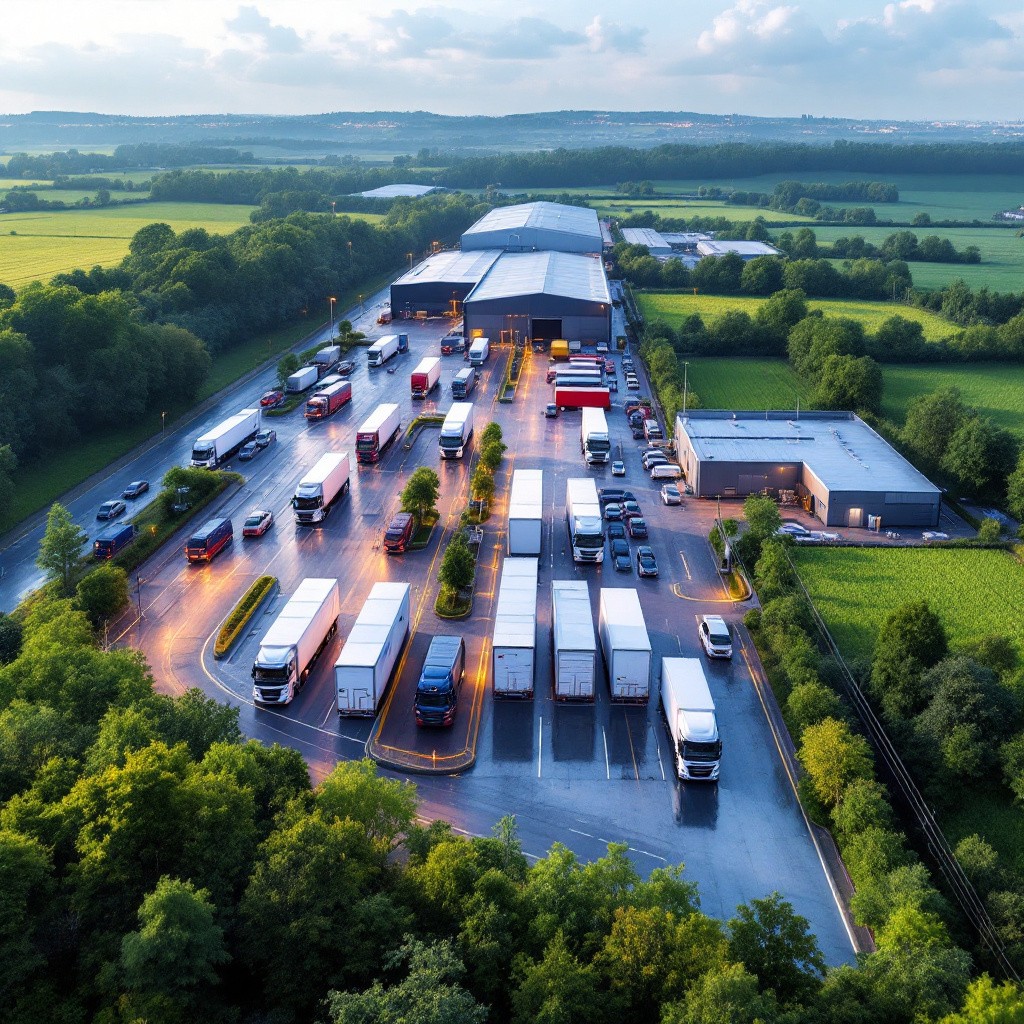
Insights
October 16, 2024
Logistics UK Report: Mixed Outlook for the Sector Amid Growth and Challenges

Insights
October 16, 2024
Logistics UK Report: Mixed Outlook for the Sector Amid Growth and Challenges
The latest report from Logistics UK reveals strong growth in the sector, with revenues up by 25.8% in 2023. However, challenges like inflation and fuel costs have impacted business confidence. The sector is also making progress in decarbonization, with a 1.4% drop in emissions.
The UK logistics sector has had a dynamic year in 2023, marked by impressive growth alongside ongoing challenges. According to the latest report from Logistics UK, the industry experienced a 25.8% increase in revenues, signaling strong demand and performance. However, this growth came with a tempered business outlook as rising inflation and high fuel prices created headwinds. On a positive note, the sector has made significant strides in decarbonization, with domestic transport emissions falling by 1.4%, showcasing a commitment to sustainability.
This post breaks down the highlights from Logistics UK’s latest report and provides insights into the opportunities and challenges facing the logistics industry.
Industry Growth: Revenues Rise by 25.8%
Despite the broader economic challenges, the UK logistics sector saw impressive growth in 2023, with revenues increasing by 25.8%. Several factors contributed to this growth, including:
Increased demand for e-commerce and online retail deliveries.
A focus on supply chain resilience and inventory management post-pandemic.
Higher volume in international trade and a rebound in freight movement.
Key Factors Behind Revenue Growth:
E-commerce Surge: Online shopping continues to drive high volumes of freight, requiring more delivery services.
Global Trade Rebound: As international markets reopened, there was an increase in imports and exports, benefiting the freight industry.
Increased Focus on Efficiency: Companies invested in improving logistics efficiency, from warehousing to last-mile delivery.
While the revenue surge is a positive indicator of the industry's strength, it’s essential to acknowledge the challenges that come with such growth.
Challenges Facing the Sector: Inflation and High Fuel Prices
The report highlights growing concerns over inflation and fuel prices, which have tempered business confidence. Though demand has remained robust, these rising costs have created significant operational challenges for logistics companies.
Impact of Inflation:
Rising costs of goods and services are leading to increased pressure on profit margins.
Higher wages are necessary to retain and attract skilled labor, but they add to the overall costs for logistics businesses.
Inflation is driving up the price of materials needed for infrastructure, repairs, and fleet management.
High Fuel Prices:
Fuel costs have become one of the most significant operational expenses for logistics companies.
Diesel prices in particular have been a major concern, directly impacting profitability.
The industry is seeking alternatives like electric trucks and biofuels to mitigate the pressure from rising fuel costs, but widespread adoption is still in progress.
Efforts Toward Decarbonization: A 1.4% Drop in Transport Emissions
Despite the challenges, the logistics industry is making notable strides toward decarbonization. According to Logistics UK, domestic transport emissions decreased by 1.4%, a positive trend as the industry aligns itself with the UK’s Net Zero goals.
Key Decarbonization Initiatives:
Electric Vehicles (EVs): More logistics companies are adopting electric trucks for urban and last-mile deliveries, which significantly reduce emissions.
Alternative Fuels: Biofuels and hydrogen-powered vehicles are being trialed as cleaner alternatives to diesel.
Fleet Efficiency: Companies are optimizing fleet management by reducing empty runs and improving fuel efficiency through better route planning.
The shift toward greener logistics solutions is likely to continue as both government regulations and market demand push the sector to adopt more sustainable practices.
Sector Outlook: What Lies Ahead?
The Logistics UK report indicates a mixed outlook for the coming years. While the 25.8% revenue growth is encouraging, challenges like inflation and fuel costs are likely to persist. However, the industry's decarbonization efforts show promise for long-term sustainability and reduced operational costs.
Opportunities Moving Forward:
Investment in Sustainable Technologies: Companies that adopt EVs and alternative fuel vehicles early could reduce costs and gain a competitive advantage.
Digital Transformation: Technologies like AI and IoT can streamline operations, reduce inefficiencies, and improve decision-making.
Global Supply Chain Optimization: As global trade continues to recover, logistics companies have the opportunity to optimize their supply chains and expand internationally.
Challenges to Overcome:
Rising Costs: Inflation and fuel prices will continue to impact profit margins unless companies find ways to optimize or switch to alternative energy sources.
Regulatory Compliance: As the UK government continues to push for lower emissions, logistics companies will need to stay compliant with evolving regulations, which may require further investments in technology and fleet upgrades.
Conclusion
The UK logistics sector has shown resilience and growth despite the challenges it faces. While rising costs and inflation have slightly dampened business confidence, the industry’s continued focus on sustainability and decarbonization marks a positive direction for the future.
As the sector moves forward, logistics companies will need to balance innovation, cost-efficiency, and sustainability to remain competitive. The strides made toward decarbonization highlight the industry's potential to contribute to the UK’s Net Zero goals while maintaining strong performance in the global supply chain.
Interested in learning more about how to navigate the logistics landscape? Visit LosisLink for expert advice on boosting efficiency and sustainability in your logistics operations. Stay ahead of the curve with our industry insights and strategies.
The UK logistics sector has had a dynamic year in 2023, marked by impressive growth alongside ongoing challenges. According to the latest report from Logistics UK, the industry experienced a 25.8% increase in revenues, signaling strong demand and performance. However, this growth came with a tempered business outlook as rising inflation and high fuel prices created headwinds. On a positive note, the sector has made significant strides in decarbonization, with domestic transport emissions falling by 1.4%, showcasing a commitment to sustainability.
This post breaks down the highlights from Logistics UK’s latest report and provides insights into the opportunities and challenges facing the logistics industry.
Industry Growth: Revenues Rise by 25.8%
Despite the broader economic challenges, the UK logistics sector saw impressive growth in 2023, with revenues increasing by 25.8%. Several factors contributed to this growth, including:
Increased demand for e-commerce and online retail deliveries.
A focus on supply chain resilience and inventory management post-pandemic.
Higher volume in international trade and a rebound in freight movement.
Key Factors Behind Revenue Growth:
E-commerce Surge: Online shopping continues to drive high volumes of freight, requiring more delivery services.
Global Trade Rebound: As international markets reopened, there was an increase in imports and exports, benefiting the freight industry.
Increased Focus on Efficiency: Companies invested in improving logistics efficiency, from warehousing to last-mile delivery.
While the revenue surge is a positive indicator of the industry's strength, it’s essential to acknowledge the challenges that come with such growth.
Challenges Facing the Sector: Inflation and High Fuel Prices
The report highlights growing concerns over inflation and fuel prices, which have tempered business confidence. Though demand has remained robust, these rising costs have created significant operational challenges for logistics companies.
Impact of Inflation:
Rising costs of goods and services are leading to increased pressure on profit margins.
Higher wages are necessary to retain and attract skilled labor, but they add to the overall costs for logistics businesses.
Inflation is driving up the price of materials needed for infrastructure, repairs, and fleet management.
High Fuel Prices:
Fuel costs have become one of the most significant operational expenses for logistics companies.
Diesel prices in particular have been a major concern, directly impacting profitability.
The industry is seeking alternatives like electric trucks and biofuels to mitigate the pressure from rising fuel costs, but widespread adoption is still in progress.
Efforts Toward Decarbonization: A 1.4% Drop in Transport Emissions
Despite the challenges, the logistics industry is making notable strides toward decarbonization. According to Logistics UK, domestic transport emissions decreased by 1.4%, a positive trend as the industry aligns itself with the UK’s Net Zero goals.
Key Decarbonization Initiatives:
Electric Vehicles (EVs): More logistics companies are adopting electric trucks for urban and last-mile deliveries, which significantly reduce emissions.
Alternative Fuels: Biofuels and hydrogen-powered vehicles are being trialed as cleaner alternatives to diesel.
Fleet Efficiency: Companies are optimizing fleet management by reducing empty runs and improving fuel efficiency through better route planning.
The shift toward greener logistics solutions is likely to continue as both government regulations and market demand push the sector to adopt more sustainable practices.
Sector Outlook: What Lies Ahead?
The Logistics UK report indicates a mixed outlook for the coming years. While the 25.8% revenue growth is encouraging, challenges like inflation and fuel costs are likely to persist. However, the industry's decarbonization efforts show promise for long-term sustainability and reduced operational costs.
Opportunities Moving Forward:
Investment in Sustainable Technologies: Companies that adopt EVs and alternative fuel vehicles early could reduce costs and gain a competitive advantage.
Digital Transformation: Technologies like AI and IoT can streamline operations, reduce inefficiencies, and improve decision-making.
Global Supply Chain Optimization: As global trade continues to recover, logistics companies have the opportunity to optimize their supply chains and expand internationally.
Challenges to Overcome:
Rising Costs: Inflation and fuel prices will continue to impact profit margins unless companies find ways to optimize or switch to alternative energy sources.
Regulatory Compliance: As the UK government continues to push for lower emissions, logistics companies will need to stay compliant with evolving regulations, which may require further investments in technology and fleet upgrades.
Conclusion
The UK logistics sector has shown resilience and growth despite the challenges it faces. While rising costs and inflation have slightly dampened business confidence, the industry’s continued focus on sustainability and decarbonization marks a positive direction for the future.
As the sector moves forward, logistics companies will need to balance innovation, cost-efficiency, and sustainability to remain competitive. The strides made toward decarbonization highlight the industry's potential to contribute to the UK’s Net Zero goals while maintaining strong performance in the global supply chain.
Interested in learning more about how to navigate the logistics landscape? Visit LosisLink for expert advice on boosting efficiency and sustainability in your logistics operations. Stay ahead of the curve with our industry insights and strategies.
The latest report from Logistics UK reveals strong growth in the sector, with revenues up by 25.8% in 2023. However, challenges like inflation and fuel costs have impacted business confidence. The sector is also making progress in decarbonization, with a 1.4% drop in emissions.
The UK logistics sector has had a dynamic year in 2023, marked by impressive growth alongside ongoing challenges. According to the latest report from Logistics UK, the industry experienced a 25.8% increase in revenues, signaling strong demand and performance. However, this growth came with a tempered business outlook as rising inflation and high fuel prices created headwinds. On a positive note, the sector has made significant strides in decarbonization, with domestic transport emissions falling by 1.4%, showcasing a commitment to sustainability.
This post breaks down the highlights from Logistics UK’s latest report and provides insights into the opportunities and challenges facing the logistics industry.
Industry Growth: Revenues Rise by 25.8%
Despite the broader economic challenges, the UK logistics sector saw impressive growth in 2023, with revenues increasing by 25.8%. Several factors contributed to this growth, including:
Increased demand for e-commerce and online retail deliveries.
A focus on supply chain resilience and inventory management post-pandemic.
Higher volume in international trade and a rebound in freight movement.
Key Factors Behind Revenue Growth:
E-commerce Surge: Online shopping continues to drive high volumes of freight, requiring more delivery services.
Global Trade Rebound: As international markets reopened, there was an increase in imports and exports, benefiting the freight industry.
Increased Focus on Efficiency: Companies invested in improving logistics efficiency, from warehousing to last-mile delivery.
While the revenue surge is a positive indicator of the industry's strength, it’s essential to acknowledge the challenges that come with such growth.
Challenges Facing the Sector: Inflation and High Fuel Prices
The report highlights growing concerns over inflation and fuel prices, which have tempered business confidence. Though demand has remained robust, these rising costs have created significant operational challenges for logistics companies.
Impact of Inflation:
Rising costs of goods and services are leading to increased pressure on profit margins.
Higher wages are necessary to retain and attract skilled labor, but they add to the overall costs for logistics businesses.
Inflation is driving up the price of materials needed for infrastructure, repairs, and fleet management.
High Fuel Prices:
Fuel costs have become one of the most significant operational expenses for logistics companies.
Diesel prices in particular have been a major concern, directly impacting profitability.
The industry is seeking alternatives like electric trucks and biofuels to mitigate the pressure from rising fuel costs, but widespread adoption is still in progress.
Efforts Toward Decarbonization: A 1.4% Drop in Transport Emissions
Despite the challenges, the logistics industry is making notable strides toward decarbonization. According to Logistics UK, domestic transport emissions decreased by 1.4%, a positive trend as the industry aligns itself with the UK’s Net Zero goals.
Key Decarbonization Initiatives:
Electric Vehicles (EVs): More logistics companies are adopting electric trucks for urban and last-mile deliveries, which significantly reduce emissions.
Alternative Fuels: Biofuels and hydrogen-powered vehicles are being trialed as cleaner alternatives to diesel.
Fleet Efficiency: Companies are optimizing fleet management by reducing empty runs and improving fuel efficiency through better route planning.
The shift toward greener logistics solutions is likely to continue as both government regulations and market demand push the sector to adopt more sustainable practices.
Sector Outlook: What Lies Ahead?
The Logistics UK report indicates a mixed outlook for the coming years. While the 25.8% revenue growth is encouraging, challenges like inflation and fuel costs are likely to persist. However, the industry's decarbonization efforts show promise for long-term sustainability and reduced operational costs.
Opportunities Moving Forward:
Investment in Sustainable Technologies: Companies that adopt EVs and alternative fuel vehicles early could reduce costs and gain a competitive advantage.
Digital Transformation: Technologies like AI and IoT can streamline operations, reduce inefficiencies, and improve decision-making.
Global Supply Chain Optimization: As global trade continues to recover, logistics companies have the opportunity to optimize their supply chains and expand internationally.
Challenges to Overcome:
Rising Costs: Inflation and fuel prices will continue to impact profit margins unless companies find ways to optimize or switch to alternative energy sources.
Regulatory Compliance: As the UK government continues to push for lower emissions, logistics companies will need to stay compliant with evolving regulations, which may require further investments in technology and fleet upgrades.
Conclusion
The UK logistics sector has shown resilience and growth despite the challenges it faces. While rising costs and inflation have slightly dampened business confidence, the industry’s continued focus on sustainability and decarbonization marks a positive direction for the future.
As the sector moves forward, logistics companies will need to balance innovation, cost-efficiency, and sustainability to remain competitive. The strides made toward decarbonization highlight the industry's potential to contribute to the UK’s Net Zero goals while maintaining strong performance in the global supply chain.
Interested in learning more about how to navigate the logistics landscape? Visit LosisLink for expert advice on boosting efficiency and sustainability in your logistics operations. Stay ahead of the curve with our industry insights and strategies.
Other Blogs
Other Blogs
Check our other project Blogs with useful insight and information for your businesses
Other Blogs
Other Blogs
Check our other project Blogs with useful insight and information for your businesses
Other Blogs
Other Blogs
Check our other project Blogs with useful insight and information for your businesses


